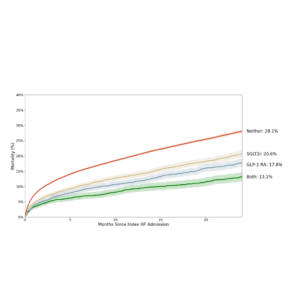The CardioCare program’s predictive suite was recently featured in BioWorld™ MedTech.
Annette Boyle – Wednesday, May 12th, 2021
egnite Inc. emerged from stealth mode in February 2021 with the goal of combining data analytics and digital health technology to illuminate and solve persistent issues in the diagnosis and treatment of structural heart disease. Three months later, it has added artificial intelligence (AI) to its flagship solution, CardioCare, to drive better diagnosis of aortic stenosis and help physicians predict which patients with moderate aortic stenosis are most likely to progress to severe disease and improve follow up care.
CardioCare evolved at Edwards Lifesciences Corp. over the last six years before being spun off into egnite. More than 50 hospitals and systems across the U.S. adopted CardioCare under Edwards’ management to standardize structural heart disease diagnosis using echocardiograms, keep patients with structural heart disease on track for follow up care, and simplify clinical workflows. Edwards remains involved in the company as a major investor and holds seats on egnite’s board as does investor Abundant Venture Partners.
Structural or valvular heart disease affects about 2.5% of American adults, with the rate rising to 13% among those over age 80, and caused 25,000 death each year, according to the CDC. The American College of Cardiology estimates that 1.5 million people in the country have aortic stenosis alone and one-third of them have moderate to severe disease.
Heart valve conditions such as regurgitation or stenosis may arise from congenital defects or may be caused by infections, aging, heart attacks or heart disease. Common signs and symptoms include heart murmurs, chest pain, palpitations, fatigue, abnormal blood pressure, and shortness of breath. Echocardiogram is the preferred diagnostic tool for structural heart disease.
Improving care
The Aliso Viejo, Calif.-based company tapped into the data contained in more than 1 million echocardiograms processed by CardioCare and now stored in egnite’s cloud dataset to develop and validate the algorithms underlying its artificial intelligence system.* The AI automatically uses echocardiograms to identify a hospital’s or system’s patients with structural heart issues such as aortic stenosis (AS), aortic regurgitation, mitral stenosis, mitral regurgitation and tricuspid regurgitation who have already been diagnosed by their physicians.
One suite of programs then applies data from echocardiograms to facilitate timely, appropriate care. “From there we put a spotlight on these patients so physicians can ensure that these huge patient populations are appropriately followed up with and don’t fall through the cracks,” egnite CEO Joel Portice told BioWorld. The program also includes custom analytics for each hospital that provides detailed information on its structural heart patient population to help standardize quality and care.
The cracks in care swallow up a significant proportion of affected patients. In a review of more than 1 million echocardiograms, egnite’s natural language processing technologies found that 25% of patients had a diagnosis of moderate or severe structural heart disease. The company’s analyses found “wide variability in guideline-directed follow-up for hospital systems nationwide,” Portice noted. “In fact, the variability was so vast that we saw guideline-directed follow-up as low as 11% for moderate AS patients two years after their first diagnosed moderate echo.”
Adding predictive power
The latest suite of CardioCare predictive algorithms takes the program into new territory. “The new algorithms we launched today specifically predict the likelihood that a patient has been undiagnosed with AS,” Portice added. “They also predict the likelihood a moderate AS patient has progressed to severe disease, enabling the physician to prioritize these patients for follow-up.”
Better identification of and follow up with patients at greatest risk is expected to increase their access to and receipt of timely and appropriate care and to improve outcomes and quality of life. “The main things we’ve observed are variability in diagnostic exams leading to underdiagnosis of disease and poor communication about the severity of disease leading to lack of follow-up,” Portice noted. “These two factors ultimately lead to patients being treated by their doctors very late, which can result in poor outcomes and irreversible damage to the heart. Structural heart disease is progressive, and the vast majority of treatment options include replacing or repairing the heart valve.”
The company plans to add predictive algorithms for other structural heart pathologies.
“We are using vast amounts of data to solve big problems and close gaps in patient care,” Portice said. “We believe this is the first of many AI applications that will become a game changer for our physician partners and deliver meaningful improvements in patient care, with the potential to save thousands of lives.”
©2021 BioWorld. Reprinted with permission from Clarivate.
*The CardioCare database contains over 1M echocardiograms. These predictive algorithms were trained on a subset of this data.



